
 20 minutes read
20 minutes read
Choosing the right legal research database feels like a high-stakes bet, doesn't it? Pick the wrong one, and you’re burning through your firm's budget faster than a first-year associate at happy hour, all for a platform that’s clunky, incomplete, or just plain wrong for your practice. Hope you enjoy explaining to partners why that "cost-effective" tool missed the one case that mattered. We’ve been there, spent the money, and felt the buyer's remorse so you don't have to.
This isn't another generic rundown of marketing fluff. We’re diving deep into the best legal research databases, from the Goliaths like Westlaw and Lexis+ to the scrappy, free alternatives that can punch well above their weight. We'll give you the unvarnished truth on what each platform is actually good for, who should use it, and when it’s an absolute waste of your hard-earned cash.
You’ll get a frank assessment of features, real-world usability, and pricing traps to avoid. Each review includes screenshots and direct links, giving you everything needed to make a smart, informed decision without mortgaging the firm to do it. Let’s find the right tool for the job.
The 800-Pound Gorilla.
When it comes to the best legal research databases, Westlaw Precision is the industry’s apex predator. Think of it as the luxury sedan of legal research; it’s powerful, comprehensive, and comes with a price tag to match. You don’t just use Westlaw, you invest in it. Its real magic is its human-centric editorial layer, powered by the legendary West Key Number System and attorney-written headnotes. These aren’t just algorithms spitting out results; they are curated pathways through the law. You're paying for the brains, not just the data.
The “Precision” upgrade is a genuine game-changer for litigation, letting you filter case law by scary-specific criteria like motion type, cause of action, or even the presiding judge. This feature alone can cut research time from hours to minutes. Its KeyCite citator is also top-tier, with clear signals (like the “Overruling Risk” flag) that stop you from citing bad law. You know, the kind of mistake that gets you laughed out of a courtroom.
Just be prepared for a serious conversation with their sales team. Pricing is a bespoke affair, and they love a long-term contract. It’s a premium tool for firms that can’t afford to miss a single relevant case, but solos and smaller practices might need to take a deep breath before signing on the dotted line.
The High-Tech Rival.
If Westlaw is the established luxury sedan, Lexis+ is its high-tech rival that just rolled off the assembly line. It’s the platform that looked at the traditional model and asked, “Can we make this smarter?” While also offering a beast of a legal library, Lexis+ sets itself apart with a more modern interface and a clear focus on integrating practical guidance and analytics directly into the research workflow. It feels less like a dusty library and more like an interactive legal dashboard.
The powerhouse here is Shepard’s, the original and legendary citator service. Its visual indicators are incredibly intuitive for quickly sussing out a case's authority. But where Lexis+ really pulls ahead for solos and small firms is its transparent pricing; you can actually see plans and pricing on their website without having to first navigate a conversation with a sales rep. What a concept. Tools like Brief Analysis, which lets you upload a document to find relevant citations, are also exceptionally useful for getting a head start on a new matter.
For larger firms, custom plans are still the norm, but for the smaller players, this transparency is a welcome change in an industry known for its opacity. It’s a top-tier choice for those who want a blend of classic research muscle and modern, efficiency-focused tools.
The All-You-Can-Eat Buffet.
If Westlaw is the luxury sedan, Bloomberg Law is the high-tech crossover SUV that comes loaded with every possible gadget. Its biggest selling point is a refreshingly simple, all-inclusive flat-fee pricing model. You get the whole shebang—legal research, dockets, practical guidance, and world-class business intelligence—without the nickel-and-diming for out-of-plan content. For corporate counsel or regulatory-heavy practices, this predictable cost is a godsend. No more surprise invoices.
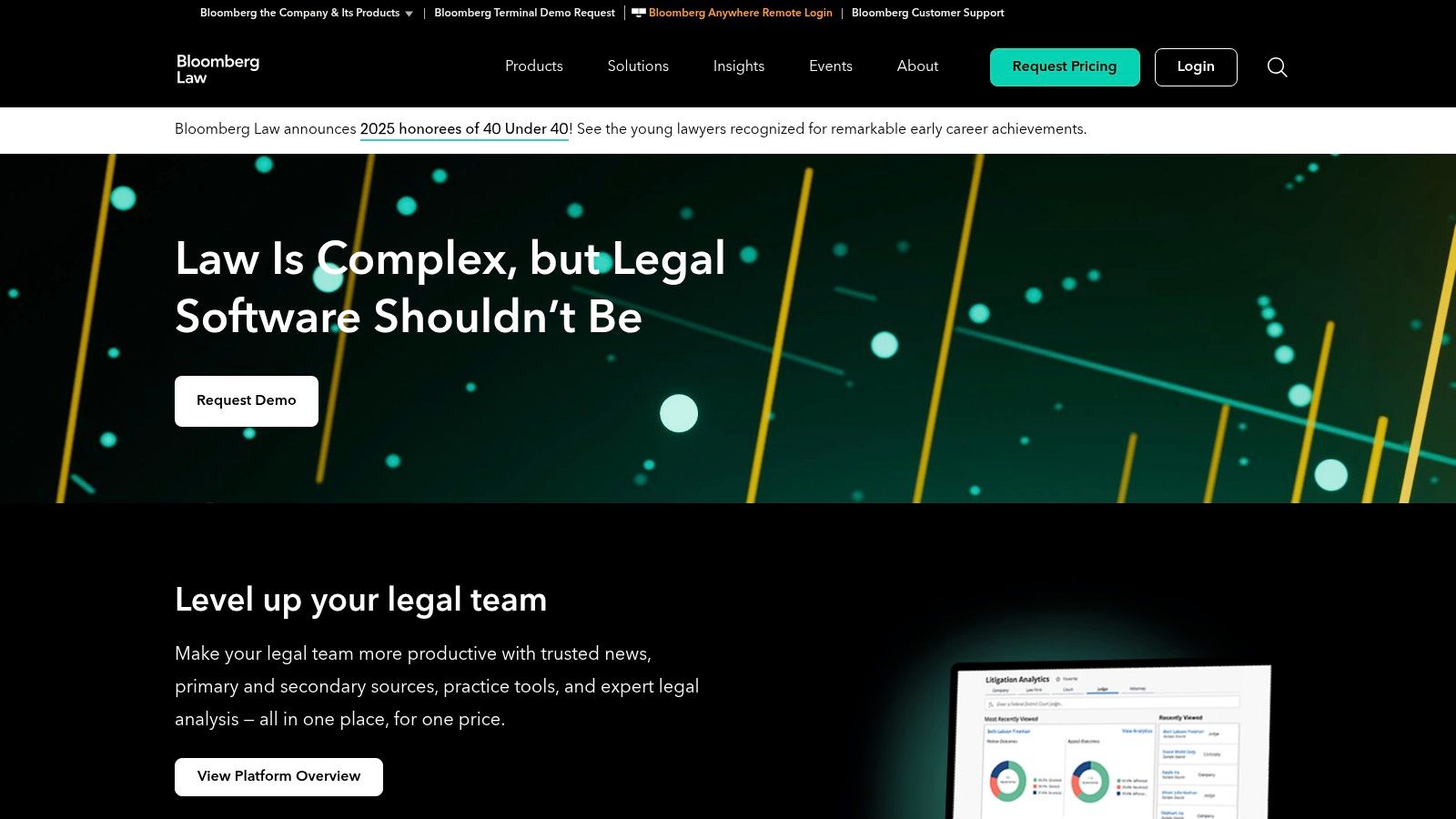
What really sets it apart is the seamless integration of Bloomberg's legendary news and business data. You’re not just researching a case; you’re analyzing the company involved, tracking its stock performance, and reading real-time news that could impact your legal strategy. Its Docket Key search is also incredibly powerful, letting you analyze litigation trends and judicial behavior.
The downside? The all-in-one approach means you pay for everything, even if you only need a fraction of it, which might feel steep for smaller, litigation-focused firms. But for those who live at the intersection of law and business, Bloomberg Law offers a unique and compelling value proposition that no other platform can touch.
The Smart Challenger.
If Westlaw is the luxury sedan, think of vLex as the impressively souped-up import that costs half as much and has a surprising number of gadgets. After acquiring Fastcase, vLex combined a massive global legal library with a robust U.S. case law database, creating a formidable challenger to the Big Two. Its mission is clear: deliver premium, AI-driven tools without forcing you to mortgage your office ping-pong table.
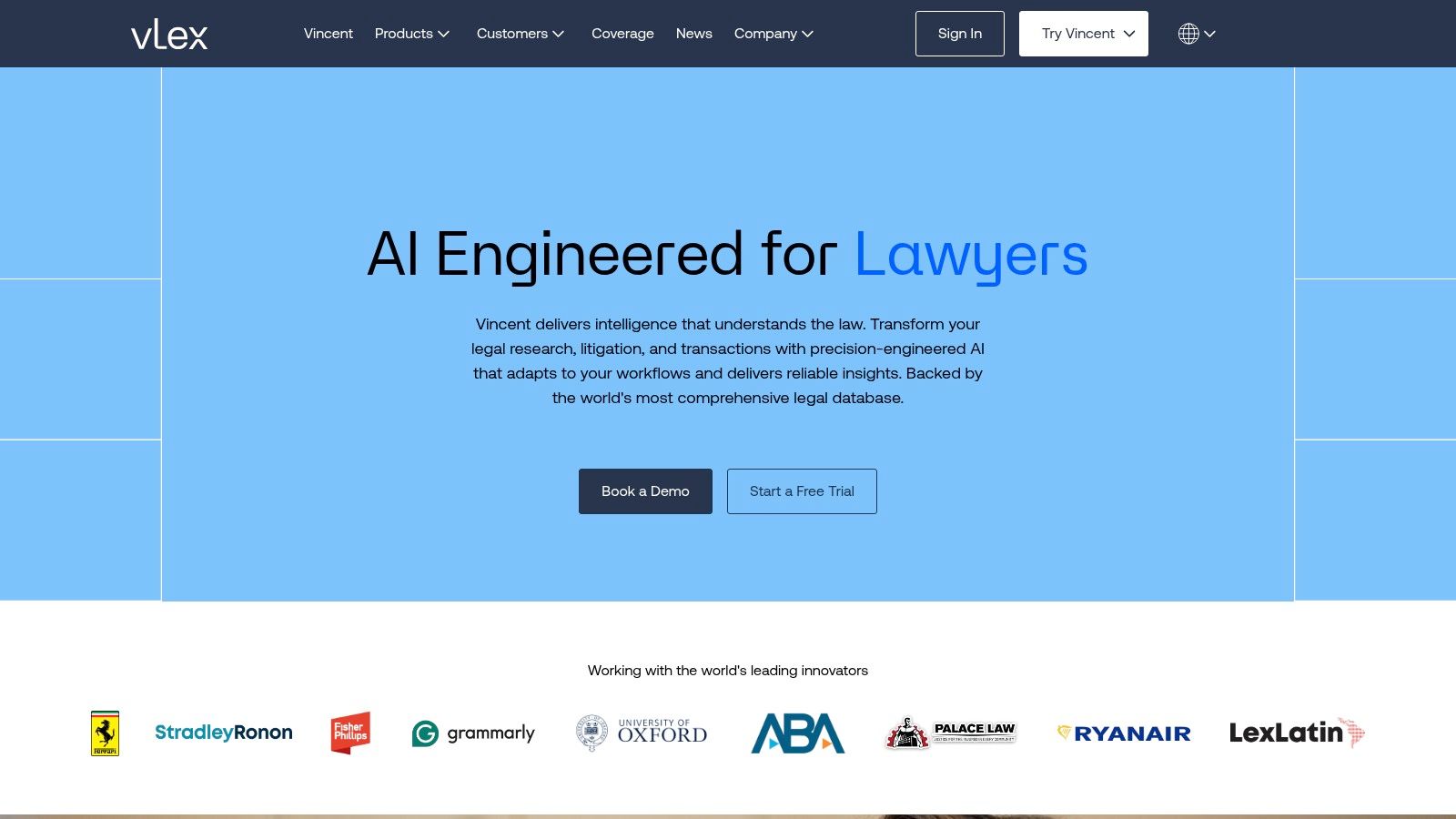
The standout feature is Vincent AI, an assistant that can answer legal questions, draft memos, and compare arguments between jurisdictions, all while providing transparent source citations. Unlike some AI tools that feel like a black box, Vincent shows its work. Its CERT citator and visual Precedent Map also offer innovative ways to check case authority and explore connections—a refreshing change of pace from the old guard. It's an excellent choice for firms wanting to modernize their research workflow without committing to a legacy-level contract.
The People's Champion.
Fastcase is the scrappy independent that carved out a massive niche by being smart, affordable, and accessible. If Westlaw and Lexis are the pricey country club memberships, Fastcase is the high-quality, no-frills gym that’s free with another service you already pay for—like your state bar membership. Its entire model is built on delivering powerful core legal research without forcing you to mortgage the office Keurig. Don’t mistake affordability for weakness; its database is robust and its citator tools, like Bad Law Bot, get the job done for the vast majority of research tasks.
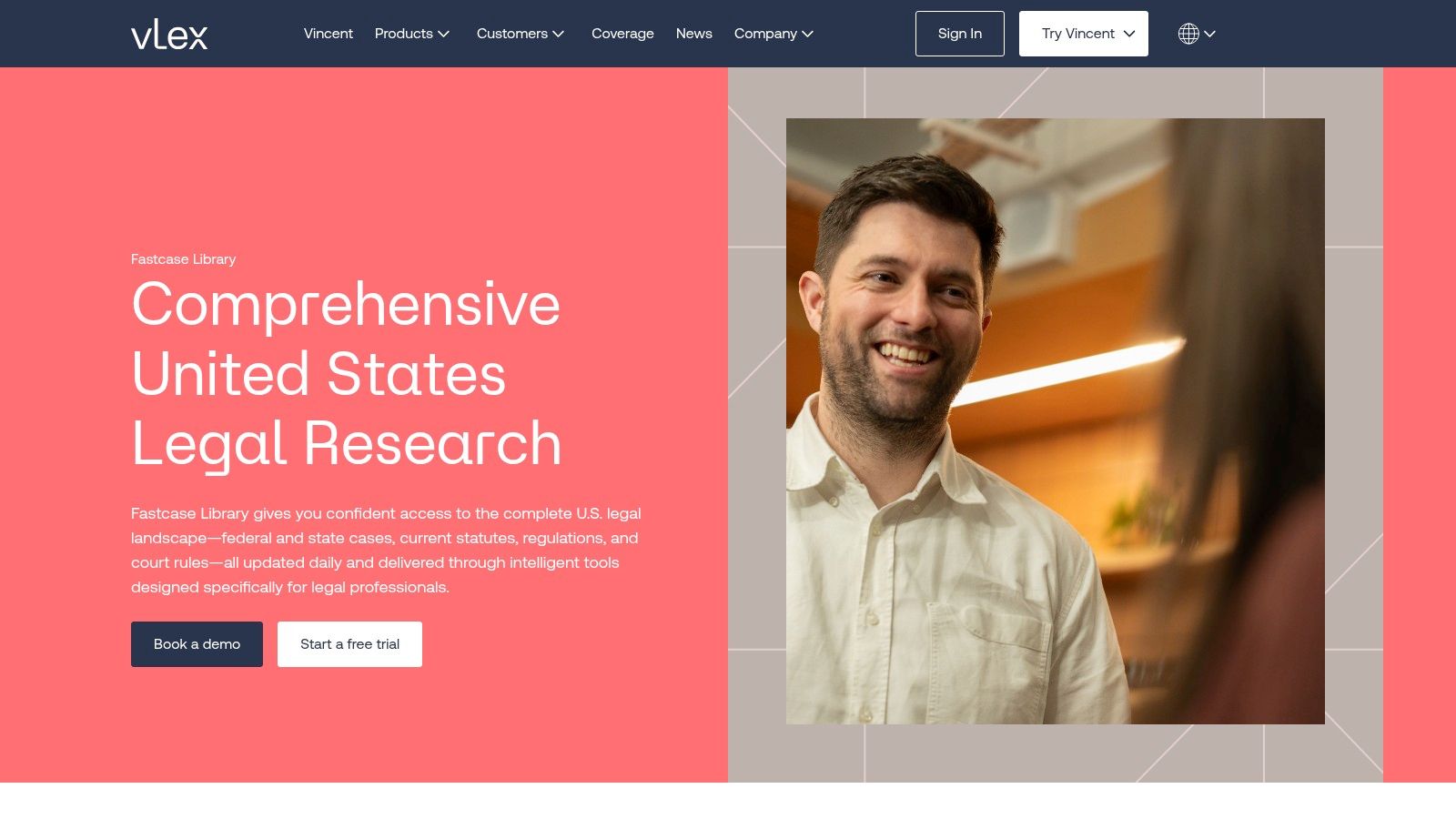
What makes Fastcase a standout among the best legal research databases is its transparent, non-predatory pricing. You can sign up for a monthly plan online without a high-pressure sales call. This approach makes it a perfect fit for solo practitioners, small firms, and paralegals who need reliable tools without a massive annual commitment. Sure, its secondary source library isn't as deep as the giants, and its analytics are more straightforward, but its core functionality for case law and statutory research is solid. Many attorneys use it as their primary tool or as a cost-effective backup to a more expensive subscription, proving its value in the modern legal tech stack. For those just starting out, you can get a better sense of how this platform fits into your workflow by learning more about the tools paralegals use.
The Specialist's Toolkit.
If Westlaw is the all-purpose luxury sedan, Wolters Kluwer VitalLaw is the specialized work truck built for specific, demanding jobs. It’s a powerhouse platform that doesn’t try to be everything to everyone. Instead, it provides insane depth in highly regulated and complex practice areas like labor & employment, securities, and tax law. VitalLaw shines with its practical guidance and deep bench of expert-authored treatises and analysis. It’s less about finding a case and more about understanding the entire regulatory landscape your client is drowning in.
Its strength is in its curated, practice-specific content and tools that go beyond primary law. Features like Smart Charts for multi-jurisdictional comparisons and integrated Agreement & Clause Builders are designed for the transactional and compliance attorney, not just the litigator. With the recent addition of VitalLaw AI, the platform is now better equipped to surface actionable insights from its dense secondary sources. It's an indispensable resource for in-house counsel and boutique firms who live and breathe in these niche areas.
The Historian's Archive.
If Westlaw and Lexis are the bustling downtowns of legal research, HeinOnline is the quiet, revered academic library where the real history is stored. It’s not where you go for breaking news on a Supreme Court case; it's where you go to find the law review article from 1923 that predicted the case. Its core strength is its vast, image-based archive of historical legal documents, making it an indispensable tool for academic research, legislative history, and cite-checking older sources. It's the gold standard for law journals, with over 3,300 titles available in a high-fidelity PDF format.
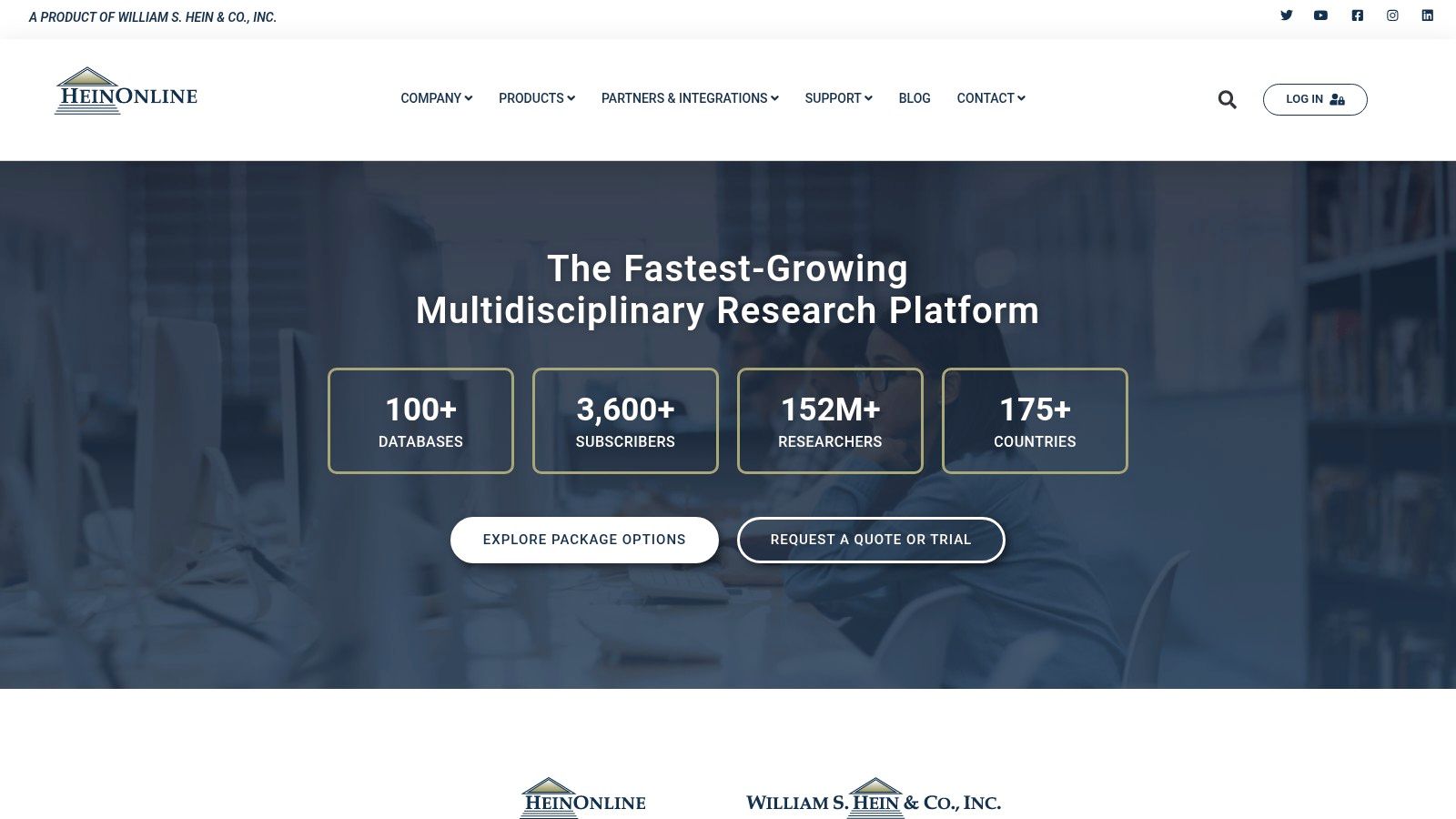
Think of it as the scholarly companion to your primary law database. While you wouldn't rely on it to tell you if a case is still good law, its collection of historical versions of the U.S. Code, Federal Register, and classic treatises is unmatched. This makes it one of the best legal research databases for anyone digging into the "why" behind a statute. While most access is through institutional subscriptions, they do offer an individual package, which is a rare and welcome option for solo researchers or academics without a university library card.
The AI-Powered Sidekick.
Once the scrappy disruptor, Casetext has now been swallowed by the Thomson Reuters empire, morphing into the AI-powered CoCounsel. This isn't your traditional, library-style legal research database anymore. Think of it less as a place to find cases and more as an AI-powered paralegal that lives on your desktop, ready to review documents, summarize arguments, and even draft entire sections of a brief. Its strength is pure, unadulterated workflow efficiency.
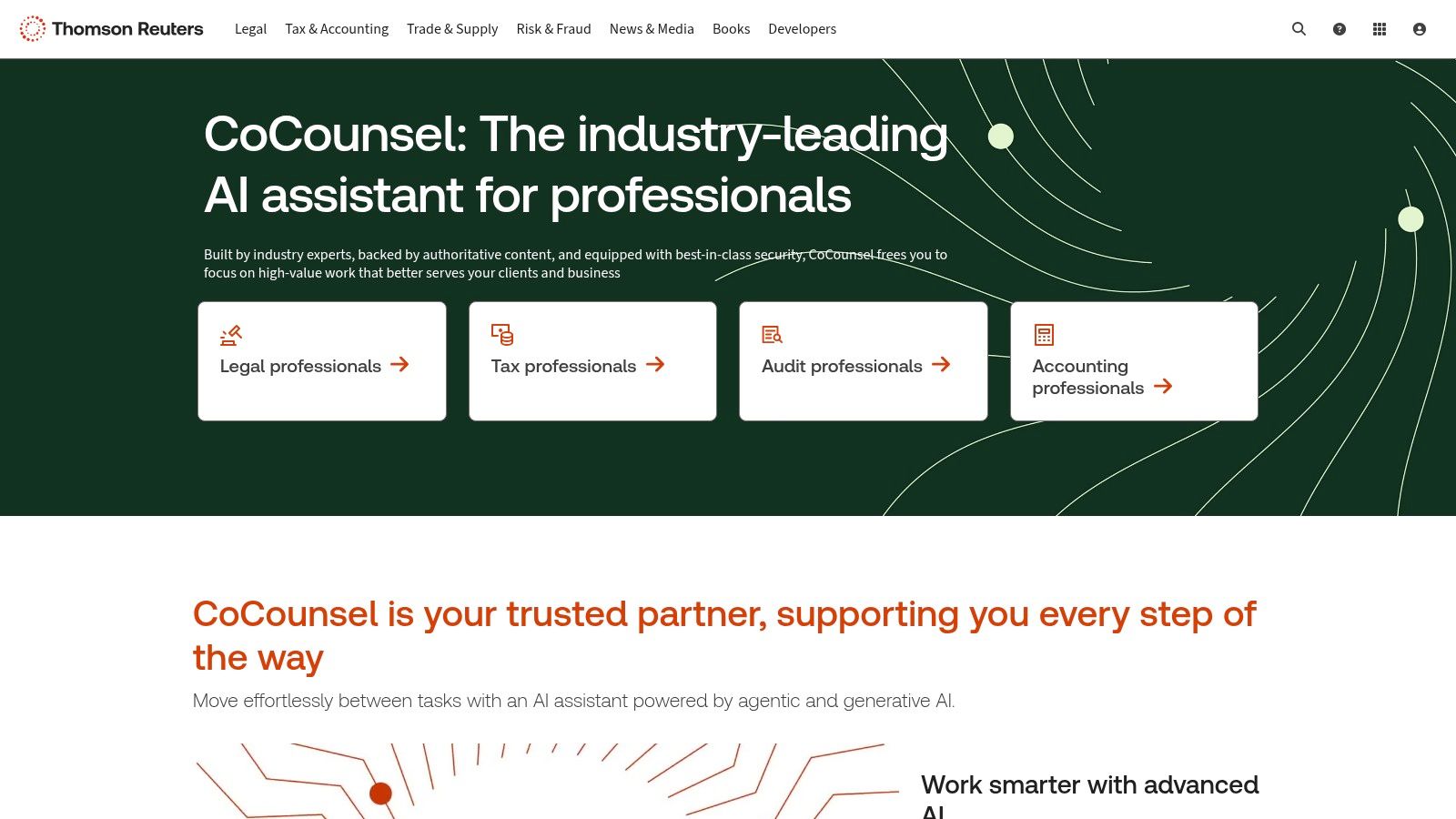
The platform’s AllSearch function is impressive, letting you query both public law and your firm’s internal documents simultaneously. The catch? The classic, affordable research plan that put Casetext on the map is gone for new users. Now, it's positioned as an AI layer, and to get the most out of it, especially for comprehensive primary law, you’ll likely need an accompanying Westlaw subscription. It's a powerful tool for firms ready to embrace AI to supercharge their legal researchers and paralegals, but don’t mistake it for a standalone, budget-friendly research tool anymore. The party's over for the budget-conscious.
The Open-Source Hero.
CourtListener, run by the nonprofit Free Law Project, is the scrappy, open-source champion in a world of Goliaths. If Westlaw is a luxury sedan, CourtListener is a reliable, souped-up pickup truck built by the community. It’s a powerful, no-frills tool dedicated to one thing: making primary legal materials truly public. Its core mission is providing free access to millions of court opinions and, crucially, its RECAP Archive of PACER dockets. You aren’t paying for fancy editorial headnotes; you’re getting raw, direct access to the law.
Its standout feature is the RECAP Archive, a user-contributed database of federal court documents that would otherwise be stuck behind PACER’s soul-crushing paywall. For docket-heavy research, it's an indispensable money-saver. While its search interface isn't as polished as its commercial rivals and lacks a citator, its sheer scope and commitment to open access make it one of the best legal research databases for budget-conscious practitioners, journalists, and academics. You can't beat the price-to-power ratio because, well, it’s free.
The Quick-and-Dirty Essential.
When you need to find a case right now and don’t want to log into a paid service, Google Scholar is the legal world’s indispensable, zero-cost Swiss Army knife. It’s the platform you use when you already know the citation and just need the text, or when you’re doing a quick preliminary search before diving into a paid database. Think of it less as a comprehensive research library and more as the world’s fastest and most accessible filing cabinet for published court opinions.
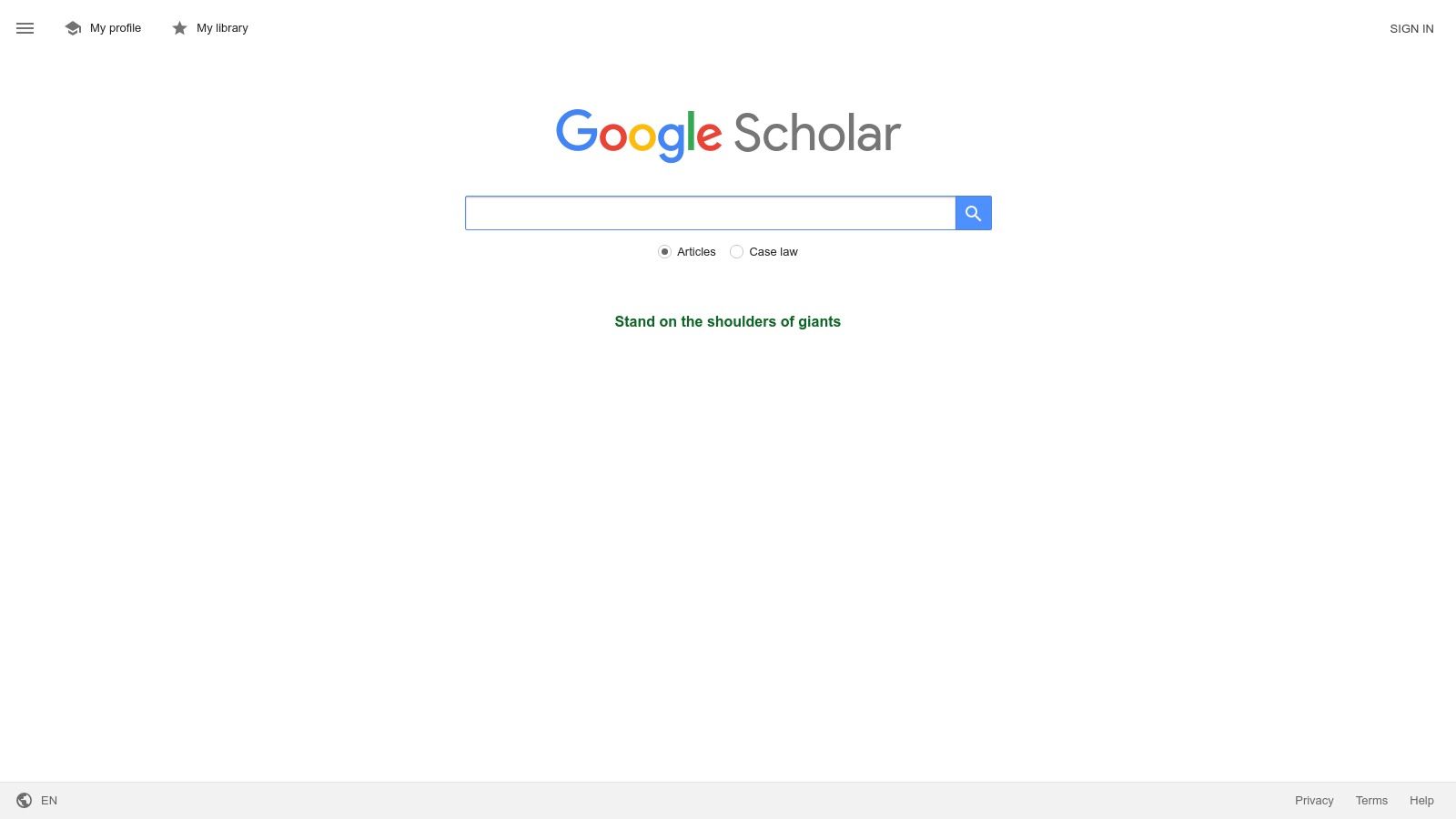
Its strength is its simplicity and speed. Punch in a case name or citation, and you’ll likely have the full-text opinion in seconds. The “How cited” feature is a brilliant, if rudimentary, citator that shows you which later cases have referenced the opinion. But be warned: this is not a substitute for KeyCite or Shepard’s. It will not tell you if a case has been overturned; it just shows you where it’s been mentioned. It's on you to do that last, critical step. For solos and small firms, this can be a powerful tool, especially when paired with affordable paralegal services who can handle the initial legwork.
The Free Starting Line.
If Westlaw is the luxury sedan, Justia is the surprisingly reliable, free-to-use scooter that gets you around town. It's not designed to compete with the paid behemoths in the best legal research databases arena, but as a quick, no-cost starting point, it's an indispensable tool. You’re not paying a dime, so don’t expect the white-glove editorial treatment, but you get solid, direct access to a huge library of primary law, including federal and state case law, statutes, and regulations. It’s a fantastic resource for pulling up a known case or browsing a statute without logging into a pricey subscription service.
Justia’s user interface is straightforward, if a bit dated and ad-supported. You can find what you need quickly, which is its main appeal. Where it falls short is in its analytical tools; there's no equivalent to a robust citator like KeyCite or Shepard’s, so you’re on your own to verify if a case is still good law. Think of it as a public law library, not a research assistant. It's the perfect supplement for when you need a document, not a deep dive.
The Bedrock of Free Law.
Let's be clear: when your budget is zero, the Legal Information Institute (LII) from Cornell Law School isn't just one of the best legal research databases, it's your lifeline. This nonprofit, open-access platform is the academic gold standard for free legal information. Think of it as the foundational public library of the law; it won't have the fancy bells and whistles of a premium service, but it provides authoritative access to the essential building blocks of U.S. law. You get the complete U.S. Code, the Code of Federal Regulations, and Supreme Court opinions, all maintained by a top-tier academic institution.
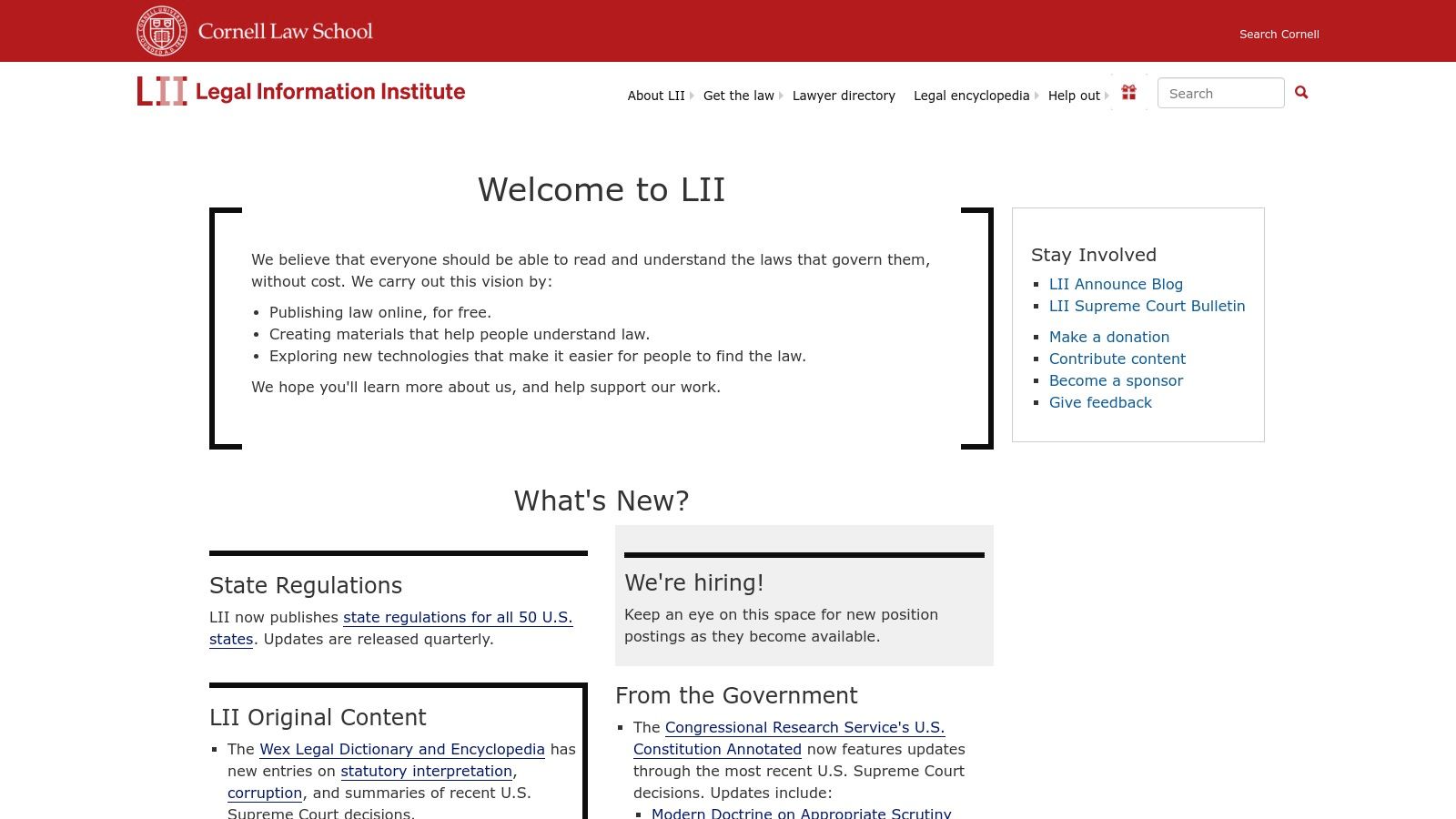
This isn't a platform where you build a complex research workflow or find deep analytical treatises. Its real power lies in providing a quick, reliable way to pull up black-letter law or check a legal definition in its Wex encyclopedia without hitting a paywall. For students, solos, or anyone needing a sanity check on a statute, LII is an indispensable starting point. Just don't expect it to write your brief for you.
| Platform | Core Features | User Experience & Quality | Value Proposition | Target Audience | Price Points |
|---|---|---|---|---|---|
| Westlaw Precision (Thomson Reuters) | West Key Number System, KeyCite, Precision Search | Industry-leading depth, attorney support | Deep, editorial legal research | Law firms, corporate counsel | High, add-ons possible |
| Lexis+ (LexisNexis) | Shepard’s citator, Litigation Analytics, AI tools | Broad coverage, strong brief analysis | Transparent pricing for small firms | Small to mid-sized firms | Mid-high, bundles, commitments |
| Bloomberg Law | Legal + market data, docket analytics, 24/7 reference | Flat-fee, business intelligence integration | All-inclusive, predictable pricing | In-house counsel, regulators | Custom pricing, sales needed |
| vLex (including Fastcase) | U.S. federal/state law, AI drafting, integrations | Modern AI workflows, strong value | U.S. & global content, AI enhanced workflows | Firms seeking AI tools | Less transparent |
| Fastcase | Nationwide statutes, Bad Law Bot, docket alerts | Affordable, flexible subscriptions | Low-cost, bar association bundles | Solo practitioners, small firms | Low, transparent pricing |
| Wolters Kluwer VitalLaw | Practice-specific dashboards, Smart Charts, AI | Editor-curated secondary content | Deep content in regulated industries | Corporate & in-house counsel | Custom sales pricing |
| HeinOnline (William S. Hein & Co.) | Law journals, historical federal documents, ML-assisted search | Extensive historical content | Unmatched depth in archives | Academic, libraries, researchers | Quote-based pricing |
| Casetext (CoCounsel by Thomson Reuters) | AI legal assistant, drafting & review, firm-wide access | AI-driven drafting, transparent per-user pricing | Modern AI workflows for teams | Firms wanting AI collaboration | Per-user subscription |
| CourtListener (Free Law Project) | Millions of opinions, PACER Archive, APIs | Free, strong docket research | Free open access | Researchers, public defenders | Free |
| Google Scholar (Case Law) | Case law search, citation graph | Easy to use, fast retrieval | Completely free | Casual users, small firms | Free |
| Justia | U.S. cases, codes, dockets, legal guides | User-friendly, regularly updated | Free legal resource | Law students, small firms | Free |
| Legal Information Institute (LII) – Cornell Law School | US Code, CFR, Supreme Court opinions, legal encyclopedia | Free, authoritative, academic maintenance | Authoritative black-letter law source | Students, public, firms | Free |
Alright, we’ve gone deep into the rabbit hole of the best legal research databases. We’ve looked at the titans like Westlaw Precision and Lexis+, the disruptive power of Casetext, and the indispensable free resources like CourtListener and the LII. You’ve seen the price tags that could make a CFO weep and the free tools that punch way above their weight class. So, what’s the final verdict? Which one do you actually need?
The truth is, there's no single "best" database. Anyone who tells you otherwise is probably trying to sell you something. The best legal research database is the one that fits your practice's budget, workflow, and specific case needs. Spending a fortune on a premium service you barely use is just as foolish as relying on a free tool when you’re facing multi-million-dollar litigation.
It’s less about the tool itself and more about the strategy behind how you use it. A sharp paralegal can work wonders with a free resource and a targeted research plan, while an untrained associate can burn through your firm’s entire subscription budget on a premium platform and still come up empty-handed. The real ROI isn't in the subscription; it's in the skill of the researcher. We're not saying we're perfect, but we are saying experience matters (toot, toot!).
Don't just pick the one with the fanciest features or the slickest demo. Here's your game plan for making a smart decision:
Ultimately, remember that these platforms are just that: platforms. They are powerful, complex, and sometimes ridiculously expensive instruments. The real magic happens when a skilled professional knows exactly how to make them sing. Investing in the right tools is critical, but investing in the right talent to wield them? That’s how you actually win.
Finding it hard to justify the cost of both a premium database and the expert staff to use it effectively? We get it. HireParalegals connects you with top-tier, US-based remote paralegals who are already proficient with the industry’s best legal research databases, giving you expert-level results without the overhead. Stop paying for tools to sit idle and start leveraging the right talent today at HireParalegals.